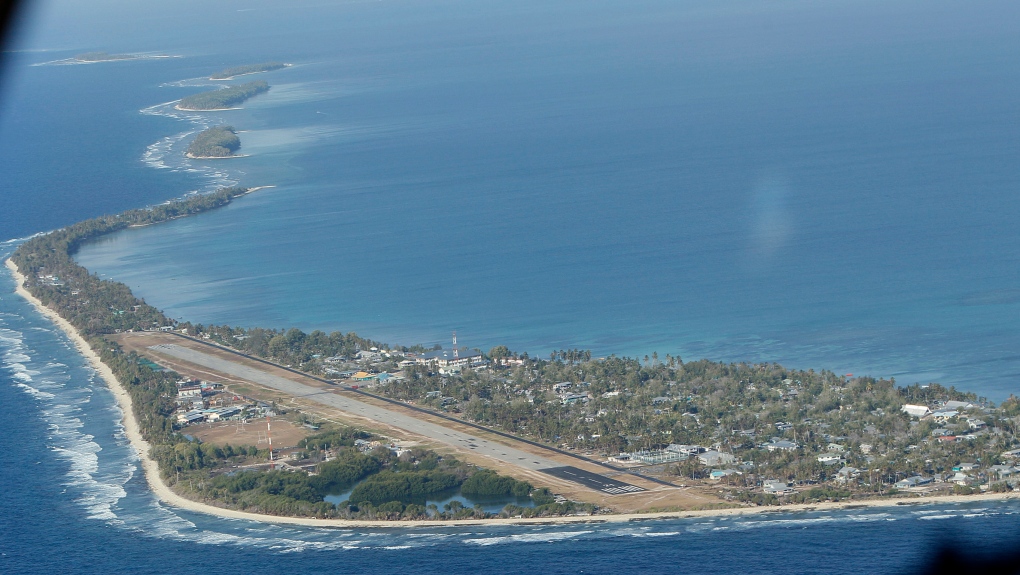By Yvonne Su, Assistant Professor in the Department of Equity Studies, York University, Canada
The recent climate migration deal signed by Australia and Tuvalu in November 2023 has been touted as providing a “lifeline” to the people of the South Pacific nation who face existential threats from rising sea levels and climate change.
The Australia-Tuvalu Falepili Union treaty is the world’s first bilateral agreement on climate mobility. Under the treaty, Australia will grant permanent residence to up to 280 Tuvaluans facing dangers posed by climate change each year.
In exchange, Tuvalu will not enter into any security or defence agreements with other countries without Australian approval. In addition, Australia will defend Tuvalu from foreign threats and provide assistance following natural disasters.
Australian Prime Minister Anthony Albanese called the deal groundbreaking and a “comprehensive partnership” that respected sovereignty.
However, others have criticised it as neo-colonial, especially for the control it grants Australia over Tuvalu’s security, maritime zones and resources.
Groundbreaking or neo-colonial?
There have long been heated debates about the idea of such an arrangement, and some see the treaty as an important step.
As the consequences of climate change become more severe, the international community needs to protect populations who face becoming stateless as their countries literally sink into the ocean.
However, some see this deal as yet another example of western countries exerting colonial influence over others. Former Tuvalu Prime Minister, Enele Sopoaga, turned down a 2019 proposal to offer Australian citizenship to climate refugees from island states in the South Pacific in exchange for granting Australia control of their exclusive economic zones and territorial seas. He called the proposal neo-colonial and an example of “imperial thinking.”
Sopoaga has reiterated those concerns regarding the Falepili Union and accused the current Prime Minister of auctioning Tuvalu’s sovereignty for money.
There were also concerns about the lack of consultation with Tuvaluans, the use of this treaty to counter China’s growing influence in the Pacific and how it is a poor example of climate justice.

Relocation is understudied
Not enough focus has been given to relocation and the topic has been understudied.
The existential dangers posed by climate change are all too real for small island nations like Tuvalu. Many face a real risk of becoming uninhabitable due to climate change. For example, Tuvalu and Vanuatu could be completely submerged by the end of this century.
Research shows that more than 400 climate and weather related relocations have taken place globally since 1970 and more will happen in the future. Fiji has one of the most thorough plans ever devised to tackle planned relocation and identifies the many logistical, financial, social and cultural challenges involved.
Among the complex plans are deeply personal and moral decisions, like what to do with burial sites. These nations are often faced with two traumatic options: let them sink or exhume the remains.
Fiji’s relocation, as well as most others, will be internal. However, the question of international relocation is even more challenging with much higher-level geopolitical challenges and social and economic consequences.
Sovereignty and disappearing land
One of the hardest questions is that of sovereignty. Will there be a time when most Tuvaluans live outside Tuvalu? How would those in the diaspora be able to exercise their national rights, if they have them? How can they maintain their distinct nationhood without land? These questions are important, but also hard to answer.
Is a country that no longer has land still sovereign? International law defines a sovereign state as having 1) a permanent population, 2) a defined territory, 3) a government, and 4) the capacity to enter relations with other states.
Aware of this, Tuvalu has already amended its constitution to assert that its statehood is permanent, so its sovereignty persists despite losing its land to sea-level rise.
They are also developing a digital nation by recreating its land in the metaverse, archiving its culture and digitalising its government.
Maritime boundaries
Maritime boundaries are divisions of Earth’s water surface areas in the context of territorial waters, contiguous zones and exclusive economic zones. The maritime boundaries of small island nations are vast. For example, Tuvalu’s ocean territories cover more than 900,000 square kilometres, which is about the size of Nigeria.
Rising oceans could shrink the maritime zones as an island sinks. There are serious implications of this as maritime boundaries determine who has the right to Pacific fisheries worth billions of dollars.
Sovereignty and maritime boundaries can be the main challenges that a global governance framework for international relocation can help to address first as those have implications on how planned relocation can unfold. In terms of how the planned relocation itself can take place, there are several ideas:
1) Special visas and treaties that facilitate climate mobility such as the Falepili Union.
2) Leasing territories has been a common solution that small island states have explored, like Kiribati’s purchase of land in Fiji.
3) Merging of several states, like how Zanzibar and Tanganyika unified in 1964 to form Tanzania, so people on islands that will be submerged can move to other areas of country.
4) Artificial and floating islands to replace submerged land territory have been contemplated, but the legal status of such islands is highly uncertain and could set dangerous precedents, such as new islands being used to claim territories within the maritime boundaries of others.
All these potential ways to allow for planned relocation come with significant challenges, which is why a global governance framework is required.
Planned relocation and, specifically, international relocation, is one of the biggest challenges of our time as the sovereignty, maritime boundaries and rights of affected nations are all at risk, let alone the lives and futures of millions around the world. Most importantly, significant action to combat the climate crisis is required from all nations so the need for mass plan relocation can be mitigated.
SOURCE: THE CONVERSATION/PACNEWS















